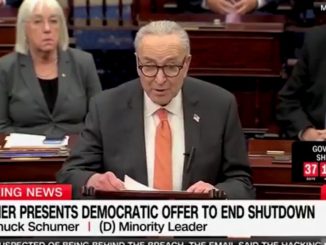
| Published April 1, 2025
The debate over waste, fraud, and abuse in government spending is nothing new. But in his recent column on Townhall, Mark Lewis asks a provocative question: Why are Democrats so opposed to eliminating these inefficiencies? His analysis delves into the political motivations and ideological divides that fuel resistance to reforms aimed at ensuring taxpayer dollars are used responsibly.
At the heart of Lewis’s argument is a seemingly simple truth—eliminating government waste should be a bipartisan goal. After all, who wouldn’t want a more efficient government that prioritizes legitimate needs over reckless spending? Yet, the issue has become highly politicized, with Democrats often resisting Republican-led efforts to cut unnecessary expenditures.
A Shift in Priorities?
Lewis highlights a stark contrast between past and present attitudes. He recalls that in 2008, even self-described socialist Senator Bernie Sanders called for eliminating wasteful government spending. Today, however, such initiatives are met with skepticism or outright hostility. What changed?
One key factor, according to Lewis, is the deep-seated animosity toward former President Donald Trump. Many efficiency-focused reforms gained traction during his administration, and their association with Trump has made them anathema to his political opponents. The result? Policies that would otherwise seem like common sense are rejected on ideological grounds.
The Moral and Cultural Divide
Beyond mere politics, Lewis touches on a broader concern—the moral direction of the country. He argues that certain factions within the Democratic Party have drifted from traditional principles of common sense and accountability. Instead, he sees a growing embrace of policies that prioritize ideological conformity over practical governance.
Lewis warns that if this trend continues, the U.S. could be heading toward an era of increased government waste, unchecked bureaucratic bloat, and declining public trust in institutions. His perspective reflects a broader conservative concern that modern liberalism is moving away from pragmatic governance and into an era of ideological extremism.
Moving Forward
So, is there a way to bridge this divide? Lewis’s column suggests that a return to common sense and bipartisan cooperation is necessary. While political differences are inevitable, ensuring responsible government spending should be a shared priority. Perhaps the question isn’t why some oppose eliminating waste, but rather, how can Americans—regardless of party—work together to make their government more accountable?
As this debate continues, one thing remains clear: addressing waste, fraud, and abuse isn’t just about saving money—it’s about preserving the integrity of government itself.
SOURCE: TOWNHALL – Why Are Democrats So Opposed to Eliminating Waste, Fraud, and Abuse?





Be the first to comment